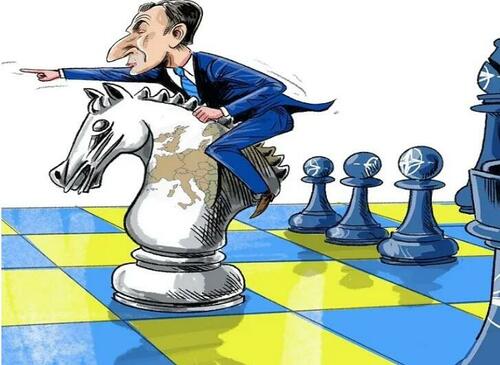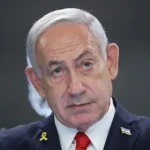
Authored by Andrew Korybko via Substack,
The Wall Street Journal cited an unnamed US official on Wednesday to report that “Macron told allies that there would be no need to involve NATO or the U.S. if Russia targeted French troops” that might conventionally deploy to Ukraine in the coming future per his infamous proposal from late February.
While he might have indeed said that, it can’t be taken for granted that the bloc or its American leader would stand aside and let Russia pulverize their partner’s forces in that former Soviet Republic.
It would reflect very poorly on them for one of NATO’s largest members to be defeated by their traditional adversary on a neighboring nation’s soil. Even though a French official claimed that Macron only had training missions, operating defensive systems, and cyberwarfare in mind when he tabled his proposal, Russia already promised to target any of its troops there. The precedent established by Russia killing dozens of French mercenaries in a missile strike in late January suggests that it isn’t bluffing either.
This analysis here argues that France’s military-strategic goal in the scenario of a conventional intervention would be to seize control of the Black Sea Coast up until the Dnieper, which could lead to the creation of a French-Russian front along that river which runs through the divided Kherson Region. Despite Macron reportedly claiming that he wouldn’t request allied assistance if his troops are targeted by Russia, it’s extremely unlikely that he’d decline doing so if they prevent him from achieving this goal.
Chairman of the Russian Security Council Nikolai Patrushev recently said in an interview that “The United States and NATO nurture plans to keep Ukraine or at least part of it as anti-Russian territory wholly controlled by them [and] focused on serving the interests of the North Atlantic bloc.”
In the event that Russia breaks through the front lines and forces the demilitarization of Kiev-controlled left-bank (eastern) Ukraine, then NATO as a whole would likely throw their full support behind this French mission.
There’d be too much pressure upon the bloc from its anti-Russian political elites to not do anything to stop the possibility of their traditional adversary crossing the Dnieper and cutting off Ukraine’s access to the sea by making a major military move on Odessa.
French forces in Romania might try to preempt that from happening either before the abovementioned breakthrough occurs or right afterwards. If Russian missile strikes obstruct their progress, however, then NATO would likely saber-rattle in solidarity.
Even if Macron has too much pride to request assistance, the bloc as a whole could still rally behind France anyhow, or a “coalition of the willing” could assemble in support of Paris.
The fact of the matter is that his reported reassurance that the scenario of French-Russian clashes in Ukraine wouldn’t risk World War III shouldn’t be taken seriously since the military-strategic dynamics could become uncontrollable if his forces get pulverized and the bloc tries to “save face” by escalating in response.
Authored by Andrew Korybko via Substack,
The Wall Street Journal cited an unnamed US official on Wednesday to report that “Macron told allies that there would be no need to involve NATO or the U.S. if Russia targeted French troops” that might conventionally deploy to Ukraine in the coming future per his infamous proposal from late February.
While he might have indeed said that, it can’t be taken for granted that the bloc or its American leader would stand aside and let Russia pulverize their partner’s forces in that former Soviet Republic.
It would reflect very poorly on them for one of NATO’s largest members to be defeated by their traditional adversary on a neighboring nation’s soil. Even though a French official claimed that Macron only had training missions, operating defensive systems, and cyberwarfare in mind when he tabled his proposal, Russia already promised to target any of its troops there. The precedent established by Russia killing dozens of French mercenaries in a missile strike in late January suggests that it isn’t bluffing either.
This analysis here argues that France’s military-strategic goal in the scenario of a conventional intervention would be to seize control of the Black Sea Coast up until the Dnieper, which could lead to the creation of a French-Russian front along that river which runs through the divided Kherson Region. Despite Macron reportedly claiming that he wouldn’t request allied assistance if his troops are targeted by Russia, it’s extremely unlikely that he’d decline doing so if they prevent him from achieving this goal.
Chairman of the Russian Security Council Nikolai Patrushev recently said in an interview that “The United States and NATO nurture plans to keep Ukraine or at least part of it as anti-Russian territory wholly controlled by them [and] focused on serving the interests of the North Atlantic bloc.”
In the event that Russia breaks through the front lines and forces the demilitarization of Kiev-controlled left-bank (eastern) Ukraine, then NATO as a whole would likely throw their full support behind this French mission.
There’d be too much pressure upon the bloc from its anti-Russian political elites to not do anything to stop the possibility of their traditional adversary crossing the Dnieper and cutting off Ukraine’s access to the sea by making a major military move on Odessa.
French forces in Romania might try to preempt that from happening either before the abovementioned breakthrough occurs or right afterwards. If Russian missile strikes obstruct their progress, however, then NATO would likely saber-rattle in solidarity.
Even if Macron has too much pride to request assistance, the bloc as a whole could still rally behind France anyhow, or a “coalition of the willing” could assemble in support of Paris.
The fact of the matter is that his reported reassurance that the scenario of French-Russian clashes in Ukraine wouldn’t risk World War III shouldn’t be taken seriously since the military-strategic dynamics could become uncontrollable if his forces get pulverized and the bloc tries to “save face” by escalating in response.
Loading…





